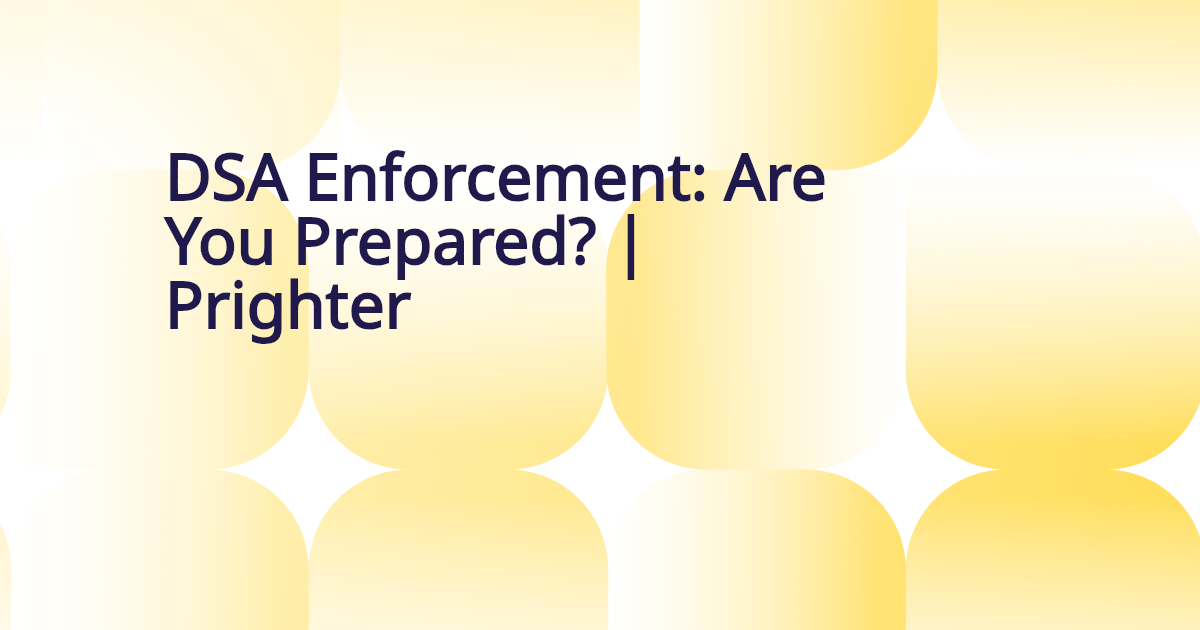DSA(デジタルサービス法)
DSA(デジタルサービス法):2024年2月17より、DSA法は仲介サービスを提供する事業者に対し、利用者と企業を守る安全なオンライン環境の整備を求める新たな義務を導入。
DSA(デジタルサービス法)は、仲介サービスを提供する事業者に対し、新たな責任や説明義務、透明性の確保を求めています。対象となるサービスには、次のようなものがあります:
- インターネットアクセスサービス
- クラウドやウェブホスティングなどのホスティングサービス
- オンラインマーケットプレイス
- アプリの配信ストア
- ドメイン登録サービス(ドメイン名レジストラ)
- シェアリングエコノミー関連のプラットフォーム
- SNS
- コンテンツ共有サイト
- 旅行・宿泊予約サイトなどのオンラインプラットフォーム
企業は、自社にどのような義務が課せられるかを見極め、それにしっかり対応することが求められます。
このセクションでは、DSAについて詳しくご紹介します。
よくあるご質問(FAQ)
デジタルサービス法(DSA)とは?
DSAの主な目的はなんですか?
DSAは、デジタル空間における違法・有害なコンテンツや商品、そして誤情報の拡散を抑制することを目的としています。これにより、利用者の安全を確保し、基本的人権を保護し、公正で開かれたオンラインプラットフォーム環境の実現を目指しています。
DSAはどんな法律?
DSA(デジタルサービス規則)はEU規則にあたり、EU加盟国すべてにおいて国内法への転換なく直接適用されます。EU全体での法的統一を図り、規制のバラつきによって単一市場が損なわれることを回避するため、連合レベルの規則として制定されています。
DSAにおける主管当局(competent authorities)は?
国内では、DSAに基づく業務を担うのは単一の当局ではなく、各国法によって複数の当局に権限が付与される場合があります。これらの当局を統括し、連携を図るために、各加盟国はデジタルサービスコーディネーターを指定して、単一の連絡窓口としています(各国のリストはこちらをご覧ください)。
EUレベルでは、欧州委員会と欧州デジタルサービス理事会(European Board for Digital Services)が、実施ガイダンスの発行から監督業務まで、幅広い役割を担っています。
DSAの適用範囲は?
DSAの対象となるサービスとは?
DSAは、オンライン仲介サービスに適用されます。特に、ホスティングサービス、オンラインプラットフォーム、および「超大規模オンラインプラットフォーム」(VLOPs)と「超大規模オンライン検索エンジン」(VLOSEs)に対しては、追加の規定が設けられています。
これらの仲介サービスを提供する場合、提供者の設立場所がどこであっても DSAの規定が適用されます。
DSAは非EU企業にも適用される?
DSAは、提供者の設立場所にかかわらず適用されます。そのため、仲介サービスを提供する非EUの事業者も、消費者や企業、その他の利用者に対してサービスを提供する場合には、域外適用の対象となります。
「仲介サービスの提供」とは?
仲介サービスが「提供」とみなされるには、以下の2つの要件が必要です:
- EU内の利用者がアクセスできる
- EUとの「実質的な関連性」がある(EUにおける利用者数やEU向けマーケティング活動等が該当)
DSAによる「利用者数の条件」とは?
「利用者数の条件」が満たされるかは、加盟国の一つまたは複数において、利用者数が全体の利用可能な人口に比してどれほどの規模かで判断されます。
DSAによる「ターゲティング」とは?
プロバイダーがEU内の利用者をターゲットとしているかどうかは、以下のすべての状況を考慮して判断されます:
- 使用言語や通貨がその国に特有であること
- EUの国ごとに注文可能であること
- 関連する国のトップレベルドメイン(.fr、.deなど)を利用していること
- アプリが該当国のアプリストアで提供されていること
- 現地言語で広告を出していること
- 現地語でカスタマー対応していること
単にEU域内から技術的にアクセスできるだけでは、EUとの「実質的な関連性」を示すには不十分です。
デジタルサービス法(DSA)の対象となる事業者とは?
Intermediary Services(仲介サービス)とは?
DSAによる他の業種分類に関係なく、以下のサービスはすべて「仲介サービス」に該当します:
- 「単なる導管」であるサービス(Mere Conduit):
サービスの利用者によって提供される情報の通信ネットワークでの送信、又は通信ネットワークへのアクセスを提供するサービス。インターネットサービスプロバイダー(ISP)など - キャッシングサービス(Caching):
情報の自動的、中間的、又は一時的な保存を含むサービスの利用者によって提供される情報の通信ネットワークでの送信で、他の利用者の要求に応じて情報をより効率的に転送することのみを目的として実行されるサービス。コンテンツ配信ネットワーク(CDN)など - ホスティングサービス(Hosting):
サービスの利用者によって提供された情報及び利用者の要求に応じた情報を保存するサービス。クラウドサービス、ウェブホスティング、有料リファレンスサービス、ファイルの保存・共有などのオンライン情報プラットフォームなど
Hosting Services(ホスティングサービス)とは?
ユーザーが提供する情報を保存・管理するサービスのことです。
例として、クラウドコンピューティング、ウェブホスティング、有料リファレンスサービス、ファイル保存・共有機能などが含まれます。
オンラインプラットフォームとは?
DSAにおいて、オンラインプラットフォームは、販売者と消費者をつなぐサービスです。
(例:オンラインマーケットプレイス、アプリストア、シェアリングエコノミー・プラットフォーム、ソーシャルメディア・プラットフォーム)
「超大規模オンラインプラットフォーム(VLOPs)」と「超大規模オンライン検索エンジン(VLOSEs)」とは?
欧州において4億5,000万人の消費者のうち10%以上にリーチするオンラインプラットフォームおよび検索エンジンは、「非常に大規模な」もの(VLOPs・VLOSEs)として分類されます。
これらには、違法コンテンツの拡散や社会的な悪影響といった特有のリスクがあるため、特別な規制が適用されます。
DSA第13条に基づくEU代理人の役割とは?
代理人に求められる役割とは?
第一に、法的代理人は主管当局、欧州委員会、欧州デジタルサービス理事会との連携・調整を円滑に行う役割を担います。
また、サービス利用者やTrusted flaggers(SNSやビデオプラットフォーム上で、「ヘイト(誹謗)」、「フェイク(嘘)」など違法な発信を探し出す機関のこと)との窓口にもなります。運用上は、電子的な連絡窓口としても機能し、多様なステークホルダーとのコミュニケーションを容易にします。
代理人は責任を負う?
DSAの適正運用と必要に応じた監督・執行を確実にするため、法的代理人には規則違反に対して責任追及を受ける可能性があります。ただし、仲介サービス提供者自身に対する責任や法的措置を阻害するものではありません。
法的代理人にはどんな要件が求められますか?
仲介サービス提供者は、法的代理人が主管当局との連携に必要な権限・リソースを備えていることを確保すべきです。具体的には、国内・欧州レベルの当局への対応に十分な資格・経験を保持していることが求められます。


















